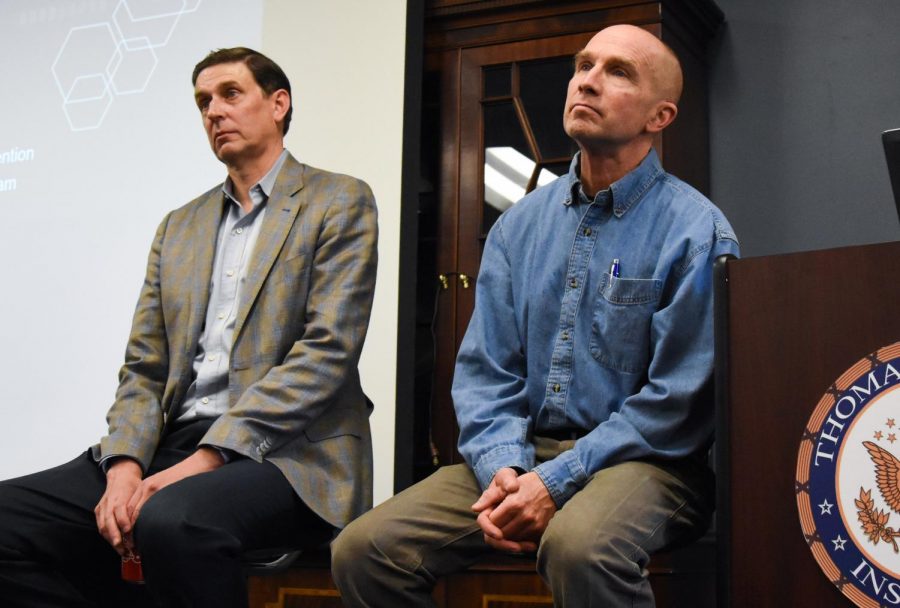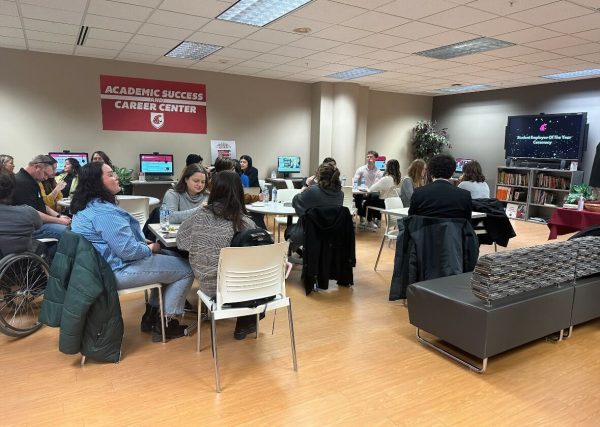Health experts address opioid crisis in America
In 2017, 68 percent of overdose deaths were opioid related
NICOLE LIU | THE DAILY EVERGREEN
John Roll, Professor and Vice Dean for Research at WSU’s Elson S.Floyd College of Medicine in Spokane, left, and Bob Lutz, Health Officer for the Spokane Regional Health District, answer questions after their combined presentation on drug addiction on Tuesday at noon in the Foley Talk room at Bryan Hall.
September 25, 2019
The Foley Institute hosted public health experts to speak on the magnitude and underlying causes of opioid abuse and drug addiction in the U.S. on Tuesday.
Dr. Bob Lutz, health officer Spokane Regional Health District, said that 70,237 people died of an overdose in 2017. Of those, 67 percent were opioid-related. These numbers also appear on the Center for Disease Control website and the National Institute on Drug Abuse site.
In the same year, according to the Center for Disease Control, 191 million opioid prescriptions were written in the U.S., which is about 59 prescriptions per 100 people, he said.
John Roll, vice dean for research at the Elson S. Floyd College of Medicine, said despite the increasing rates of use and abuse of opioids, the epidemic is less about the drugs themselves and more about social environments that encourage drug use.
The opioid crisis really started to pick up following recessions in the 2000s as economic opportunities diminished across the nation, Lutz said. Drug addiction disproportionately affects the poor and populations of color.
Roll said impoverished environments encourage people to use powerful reinforcers like drugs as a way of escaping their situation or feeling better about it.
“People don’t just wake up and decide they want to be addicted,” Lutz said. “Environments force people to choose an out.”
He said for many people in difficult family, social and economic situations, drugs are that escape.
“Our environments are a significant contributor as to why we choose certain substances,” Lutz said.
Both Lutz and Roll said that the way society dealt with addiction in the past is flawed and ineffective.
Lutz said he suggests providing treatment rather than incarceration to those suffering from addiction, giving peer support to recovering addicts from individuals who have experienced addiction and recording better data to help understand addiction.
“Unfortunately, there is a big gap between those who need and those who actually receive treatment,” Lutz said.
Public health is what we do as a society collectively to assure the conditions in which people can be healthy, he said.
Roll said drug abuse should be viewed by the public as less of a moral problem for the user and more of a problem with the morals of society.























Naomi Wallace • Sep 25, 2019 at 1:23 pm
Thank you for your coverage of this event. This event was co-sponsored by the Graduate and Professional Student Science Policy Initiative (GPSSPI). We worked hard to plan this event and we would appreciate being acknowledged in your coverage. Thank you!